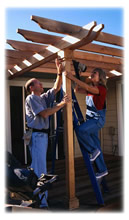Tool up for working outdoors safely

Sprucing up around your yard or home? West Florida Electric Cooperative and the Electrical Safety Foundation International offer the following tips for working safely and avoiding accidents when using power tools outdoors:
Use only weather-resistant heavy gauge extension cords marked "for outdoor use" and be sure the cordís amperage rating is higher than that of the connected electrical equipment. If the cord becomes hot, switch off the connected equipment. Donít use any extension cord that is cut or damaged. Touching even a single exposed strand can give you an electric shock or burn. So you wonít accidentally use it later, immediately discard any cord that heats up or is damaged.
Carry tools by their handles, not their cords. Switch tools off before plugging or unplugging them, and always unplug tools before cleaning or repairing them or changing their attachments. Discard any tool that sparks or delivers a shock.
If youíll be using a ladder, pick a clear route for carrying the ladder Ė horizontally, never upright Ė to the work site. Keep the ladder at least ten feet away from power lines, making sure that, if it fell, it wouldnít contact any power line, wire or other electrical equipment. While on the ladder, make sure you donít lift any object into an overhead line.
Keep cords out of your path or work area. Throw the cord over your shoulder.
Keep your work area and materials as clean and dry as possible. Dirt and dampness increase the risk of shock. Make sure your clothing and work clothes arenít damp, either.
Never remove the third prong of a three-prong plug. Convert two-prong outlets using an adapter with a ground tab. Also, never force a plug into an outlet if it doesn't fit easily.
Donít use power tools near any water, including water pipes; store them in a dry place when not in use. Should you ever drop any type of electrical equipment into water, unplug the item before attempting to retrieve it.
Donít wear loose clothing or jewelry when using power tools. Removing metal jewelry, including rings or watches, is recommended.
Contact with underground power lines are just as dangerous as with overhead ones, and they might not be located where youíd expect. Call WFEC before you dig.
If your outdoor receptacles donít have ground fault circuit interrupters, or GFCIs, install them. GFCIs are designed to prevent serious injury or death from electrical shock by detecting ground faults at very low levels. If a GFCI senses minimal current leakage to ground in an electrical circuit, it assumes a ground fault has occurred and interrupts power fast enough to prevent serious injury from electrical shock. The three types of GFCIs designed for home use -- wall receptacle, circuit breaker and portable plug-in -- are all three readily available, inexpensive and easy to install.
Never remove or modify shields, guards or insulation on power tools or lawn equipment, not even for speed or convenience. Read and follow the manufacturerís instructions when using any product powered by electricity.
If youíre upset, hurried, overheated or otherwise distracted, put the power tools down until you can focus on the job.
For additional information about electrical safety, log on to www.nesf.org or or send a 60Ę stamped, self-addressed No. 10 (business size) envelope to Electrical Safety Foundation International, 1300 North 17th St., #1847, Rosslyn, VA 22209.
Page created and maintained by West Florida Electric Cooperative, Inc. © 2001.
designed by embryo design